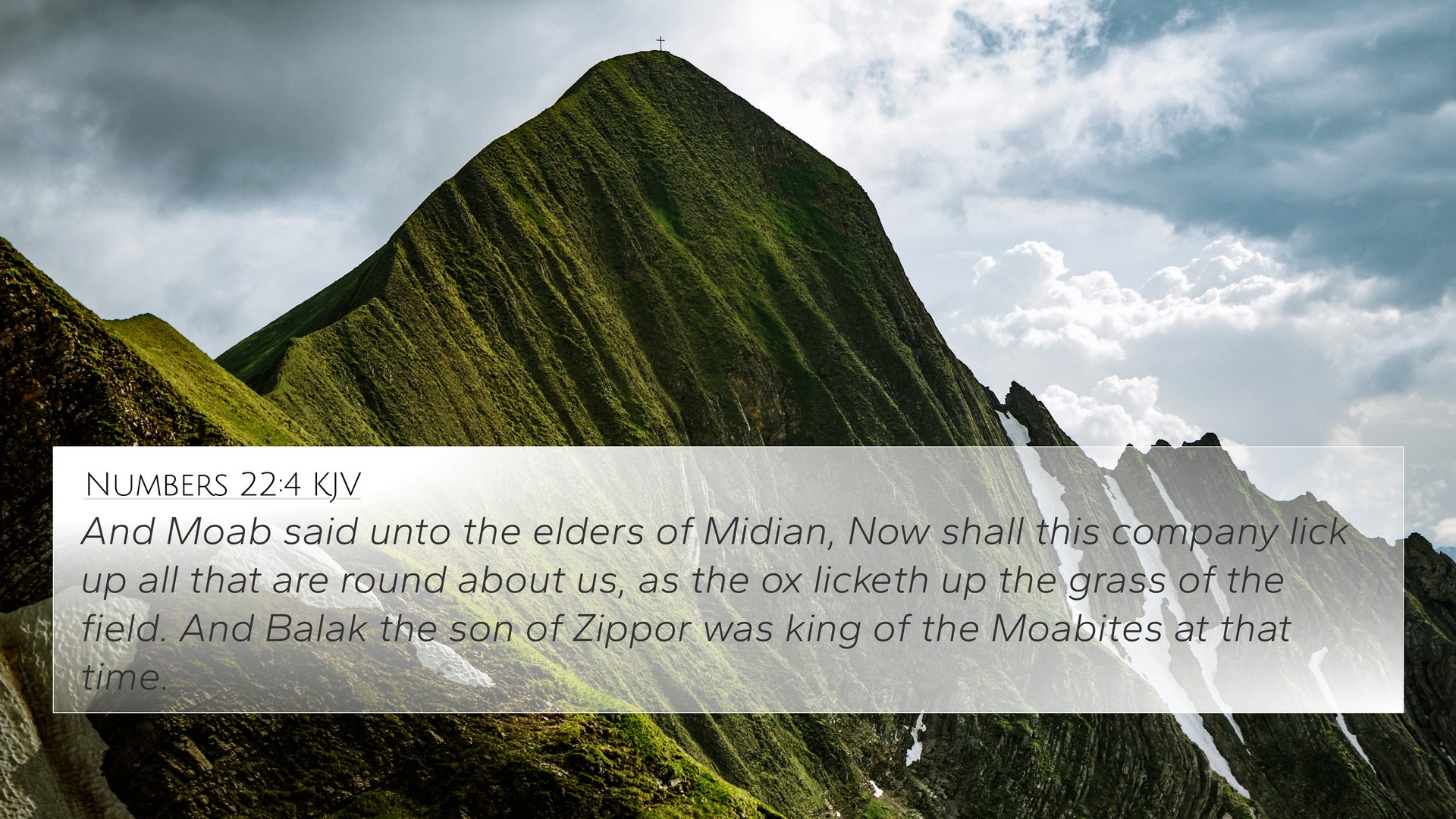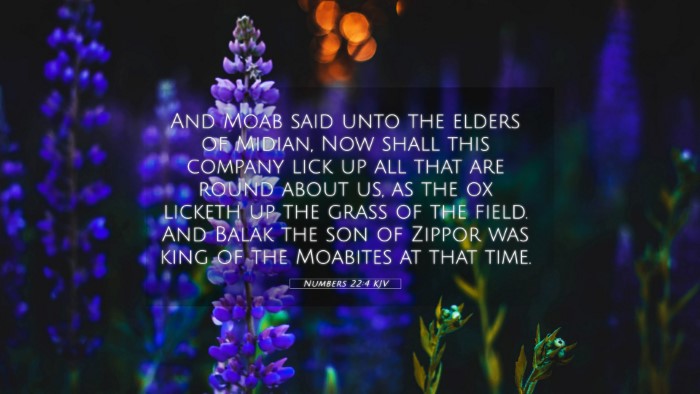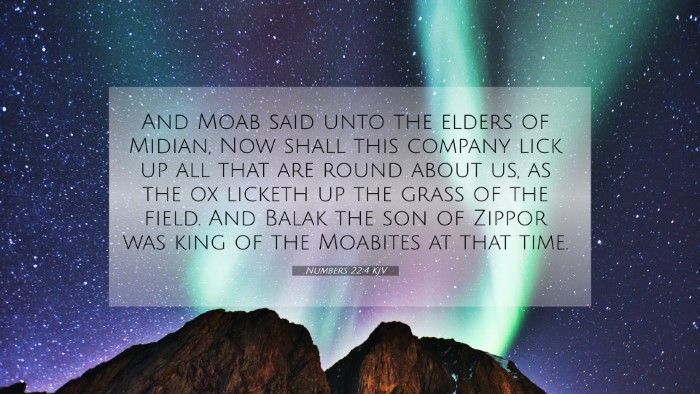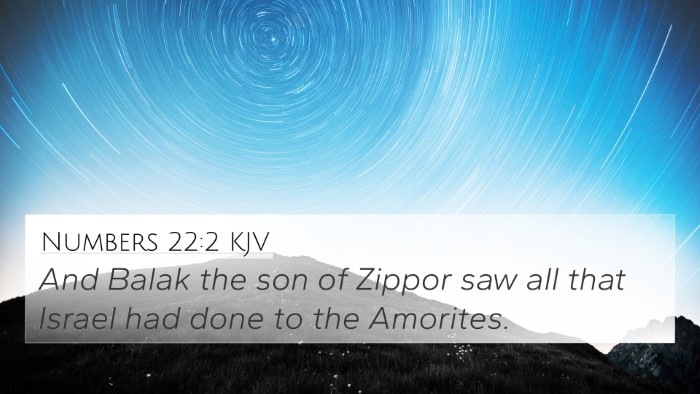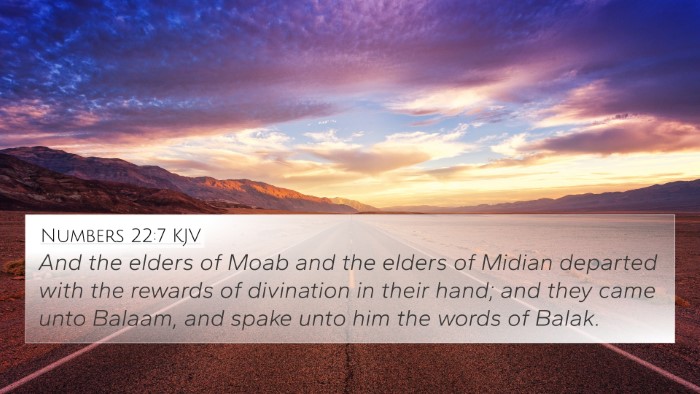Bible Verse Meaning: Numbers 22:4
Verse Reference: Numbers 22:4 - "And Moab said unto the elders of Midian, 'Now shall this company lick up all that are round about us, as the ox licketh up the grass of the field.' And Balak the son of Zippor was king of the Moabites at that time."
Contextual Overview
The verse occurs in the narrative of Balak, king of Moab, who observes the Israelite camp and is filled with dread. The Moabites feared the vast numbers of the Israelites and their past victories over nations. This verse captures Balak's response, as he seeks counsel from the elders of Midian about how to approach the threat posed by Israel.
Interpretation from Commentaries
- Matthew Henry:
Henry emphasizes the fear that Balak possessed towards the Israelites, considering their former victories, especially against the Amorites. He notes how Balak perceives the Israelite grip on the surrounding territories as a threat to Moab's existence, indicative of the overarching theme of God's chosen people's influence.
- Albert Barnes:
Barnes comments on the imagery used by Balak, comparing Israel’s army to an ox that devours grass. This metaphor highlights both the consuming nature of the Israelites and the fear they instilled in their enemies. Balak's reference to an 'ox' indicates a strength that could consume and annihilate the resources of Moab, bringing destruction.
- Adam Clarke:
Clarke presents a view that underscores the diplomatic action of Balak as a response to a perceived existential threat. He elaborates that asking counsel from Midian indicates a willingness to seek strategic alliances against what seems to be an unstoppable force in Israel.
Thematic Connections
This verse touches upon significant themes in biblical literature, including fear of the 'other', reliance on divine protection, and the prevailing power dynamics between nations. The fear Balak expresses foreshadows his later actions in trying to curse the Israelites.
Cross-References to Consider
- Exodus 15:14-16: The dread of nations describes the impact of Israel’s victory at the Red Sea.
- Deuteronomy 2:9: God forbids Israel from invading Moab, showcasing divine protection.
- Joshua 24:9-10: Balak's actions later seen in the context of Israel's history with Moab.
- Psalms 83:1-8: A prayer for help against a concerted effort of nations, similar to Balak’s coalition.
- Micah 6:5: Recalls the actions of Balak, emphasizing the historical animosity between Moab and Israel.
- Numbers 23:7: Balak's later attempts to curse Israel add depth to the fears expressed in 22:4.
- Galatians 3:13: Reference to Christ's work, contrasting blessings versus curses, giving a broader theological interpretation of Israel.
Practical Applications
This verse reminds believers of the importance of faith over fear. Balak's response illustrates the instinct to form alliances in times of great anxiety rather than relying on God's direction. As believers today navigate their own fears of the unknown, this account serves as a reminder to trust God's sovereignty.
Key Takeaways and Conclusion
Numbers 22:4 serves as a pivotal moment not just in the book of Numbers but in understanding the ongoing narrative of Israel's journey. The insights drawn from various commentaries provide a comprehensive view that connects scripture's overarching themes of fear, divine assurance, and the magnetic influence of God's chosen people.
As we explore the deeper meanings of this passage, the connections to other biblical texts highlight the intricate tapestry of God's interactions with humanity, helping readers to cross-reference and contextualize their studies.
Further Study Recommendations
For readers seeking deeper insights, consider utilizing various tools for Bible cross-referencing. These include:
- Bible concordance for finding related verses.
- Thematic study methods for linking Bible scriptures.
- Comprehensive Bible cross-reference materials for sermon preparation.
In conclusion, understanding Numbers 22:4 through a comprehensive lens equips believers with the knowledge to navigate their faith journey while emphasizing the importance of scriptural cross-referencing for enriched study.
